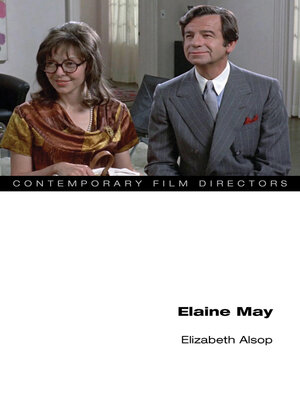
Sign up to save your library
With an OverDrive account, you can save your favorite libraries for at-a-glance information about availability. Find out more about OverDrive accounts.
Find this title in Libby, the library reading app by OverDrive.



Search for a digital library with this title
Title found at these libraries:
| Library Name | Distance |
|---|---|
| Loading... |
A master of subverting tropes with surgical precision, Elaine May forged a career in 1970s Hollywood with films like The Heartbreak Kid and Mikey and Nicky. Elizabeth Alsop explores the director's non-conformist and uncompromising vision while looking at May's films against trends in classic and post-classical Hollywood. Shaped by her background and success in the theater, May brought the biting humor of her improv comedy to her filmmaking. But unfriendly media and a system hostile to both her methods and sensibility consigned her to "director's jail" after the failure of Ishtar. As Alsop moves through the filmmaker's four movies, she tracks May's inventive treatment of favorite themes like hapless male characters and the inanities of American culture. She also considers May's work in relation to her multifaceted career as a writer and performer.
|Elizabeth Alsop is assistant professor of communication and media at the CUNY School of Professional Studies and a faculty member in Film and Media Cultures at the CUNY Graduate Center. She is the author of Making Conversation in Modernist Fiction.
A compelling reconsideration of an iconoclast and original, Elaine May reveals how a surprisingly radical auteur created her trademark cinema of discomfort.
|Acknowledgments
An Unsentimental Education: The Films of Elaine May
A New Leaf and The Heartbreak Kid: Unromantic Comedies
Mikey and Nicky: Digression and Masculine Dysfunction
Ishtar: Trolling Hollywood
Flopping and Feminist Film Historiography
An Interview with Elaine May
Filmography
Bibliography
Index
|"A dynamic analysis that celebrates and problematizes an influential, complex, multifaceted, and singular artist and talent. Alsop makes revelatory connections between May's formative start in live comedy improv, as a writer for theater and film, and as a performer on stage and screen to not only track May's unique style, but to understand her creative process."—Maya Montañez Smukler, author of Liberating Hollywood: Women Directors and the Feminist Reform of 1970s American Cinema|Elizabeth Alsop is assistant professor of communication and media at the CUNY School of Professional Studies and a faculty member in Film and Media Cultures at the CUNY Graduate Center. She is the author of Making Conversation in Modernist Fiction.







